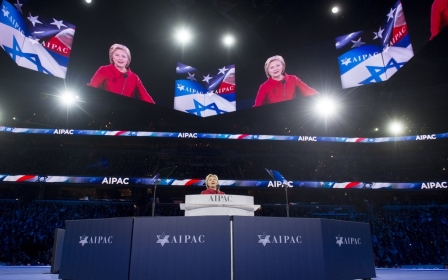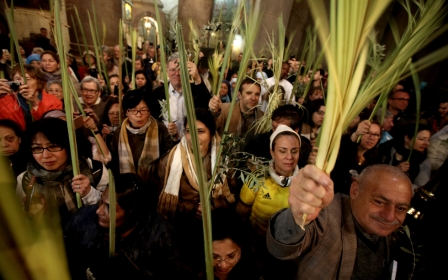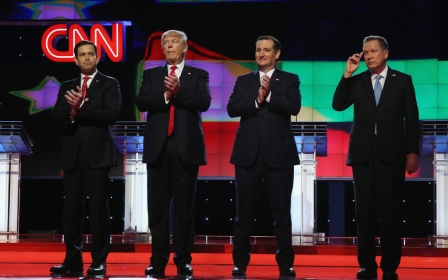Can Palestinian Evangelicals influence US vote?
This month saw the fourth Christian Evangelical convention in Palestine as more than 400 delegates, mostly from the USA, descended on Bethlehem to take part in what has become an annual gathering titled “Christ at the Checkpoint”. Thick American accents resounded across the Orient Palace Hotel. The old tried to negotiate their diet of “Steak” with waiters offering few too many salads with tahini.
The young paced the streets of Bethlehem smoking shishas with their Palestinian counterparts discussing Middle East politics, the Bible and, of course, Donald Trump. In the evening, everyone sang hallelujah and recited the Lord’s Prayer in Arabic and English alongside a few other tongues.
The atmosphere is charged and there is a lot of talk about attitude shifts among US evangelicals in their views on Israel/Palestine. I listen to the speakers and cast around for further opinions in an attempt to gain some clarity. Is this a self-selecting crowd? Or am I looking at a new movement that can serve as a genuine catalyst for change and, if so, where is this going to take us and how fast?
My thoughts are interrupted by the voice of the director of the conference, Reverend Munther Isaac, a winsome young theologian from Bethlehem, who has only just been ordained by the Lutheran Evangelical Church in Jordan and the Holy Land. The title of his paper, he tells us, is “Christian Zionism as an Imperial Theology”. “Today, I want to plead with you to look at it the way we see it as Palestinian Christians. What does it look like to be at the receiving end of this theology?”
He is followed by Hendrik "Hank" Hanegraaff, a prominent American Evangelical and radio host, known as “Bible Answer Man”, who dismisses today’s notion of the “Promised Land” on the grounds that all promises God made to Abraham have already been fulfilled and that the Kingdom of God is no longer confined to a land but dwells among people.
Are we confusing a modern-day militaristic state with biblical Israel just because it chooses to go by the same name? Who controls the narrative? Is it God or is it Caesar? People quote from Genesis and speeches are streamed online provoking an immediate barrage of criticism from angry opponents, though the vitriol this year is a little bit more sophisticated. The organisers tell me: “It shows they are taking us more seriously.”
The convention is the brain child of Reverend Alex Awad, a board member of Bethlehem Bible College, an evangelical institution established in 1979 to offer high-quality theological education and train Palestinian Christian leaders for service in the local church and community. This is how long it took for evangelical churches to put down roots in Palestine.
The earliest missions would have started in the late 19th century but their preaching fell on deaf ears. Bringing “The Good News” to a people who saw themselves as the primary guardians of “the news” was not such a brilliant idea and the majority of Palestinian Christians chose to stay part of mainstream churches. They remained either Catholic or Orthodox.
The missionaries then sought to attract converts by offering the most disadvantaged of locals “gift aid” parcels which normally contained food, clothes and other necessities. Locally, these came to be known as “Tulums” which literally translates as “grievance parcels”. This is how the first evangelical communities were formed in Palestine and it took some time for them to find their feet and gain stature. Now that they have, they are sending the “Tulums” back and their “packages of grievances” are very clear. They want a more Godly theology and an end to the Israeli occupation.
I joke with Jonathan Kuttab, the flamboyant Jerusalem lawyer who was raised as a Bible-reading tea-totaller in the “Church of God”. “There are so few of you,” I say “But you are causing a racket.” Palestinian evangelicals make up only 2 percent of Palestinian Christians who, in turn, make only 0.5 percent of the Palestinian population. Jonathan laughs, “Right, but this is why we feel a special responsibility.” Being the Holy Land darlings of so many American churches means they also have the vehicle and the institutional support to make it happen.
All this does not answer the question about where we are going or the capacity of this fired-up crowd to influence change. Judging by the fierce competition among presidential hopefuls in the US to proclaim support for Israel, speaking of major shifts any time soon seems like a fanciful idea. Most of the hard-headed delegates confirm my suspicion but Gary Burge, who teaches the New Testament at Wheaton, a conservative evangelical college in the state of Illinois, points to the latest poll by the Pew Research Center.
The shift does not yet translate into a voting block because it is happening among the youth. Almost half of young evangelicals today have shifted towards a more even-handed position often referred to as “PPP”- Pro Israel, Pro Palestine, Pro Peace. They are less apocalyptic about the “Second Coming” and more apocalyptic about the environment and America’s foreign policy. Yet, when it comes to voting, American youngsters are notoriously difficult to mobilise. We will have to wait until they get to 28.
If this is what it takes then this is easy maths which, though unfathomable now, could be within reach in a space of one decade. I sit next to an old American Methodist with an intelligent face: “What do you think?” I ask. I am trying to mine him for his deepest instincts. I know he has been through several shifts and was around when Evangelicals voted as a bloc for the first time in US history, choosing to support Ronald Reagan. “We are not there yet but it is coming. All I can say: when it does come it will happen very fast and it will all look sudden.”
I have guessed as much. Most political shifts seem to follow this same pattern, though surprises would probably seem less so if we accept that change often only has two phases - preparatory and breaking point. Another condition is “claimants”, who - even if they are tiny in number - are essential, provided they are determined to fully leverage the tools available within their playing field.
This certainly adds poignancy to this new enterprise established in the heart of Bethlehem with impressive determination and a solid line across the Atlantic. The way I see it: Palestinian evangelicals are certain to continue growing in stature, steadily expanding their reach and gently pushing towards the moment we might all soon experience as “The avalanche”.
- Leila Sansour is an acclaimed film maker and the founder and executive director of Open Bethlehem, a project that works to build a global network of ambassadors for the city of Bethlehem (www.openbethlehem.org).
The views expressed in this article belong to the author and do not necessarily reflect the editorial policy of Middle East Eye.
Photo: The conference of Christ at the Checkpoint in Bethlehem (L-R): Dr Bishara Awad, founder and President Emeritus of Bethlehem Bible College; Reverend Yohanna Katanacho, professor of Biblical Studies and academic dean at Nazareth Evangelical College; and Sami Awad, Founder of Holy Land Trust (courtesy of Bible College).
New MEE newsletter: Jerusalem Dispatch
Sign up to get the latest insights and analysis on Israel-Palestine, alongside Turkey Unpacked and other MEE newsletters
Middle East Eye delivers independent and unrivalled coverage and analysis of the Middle East, North Africa and beyond. To learn more about republishing this content and the associated fees, please fill out this form. More about MEE can be found here.





